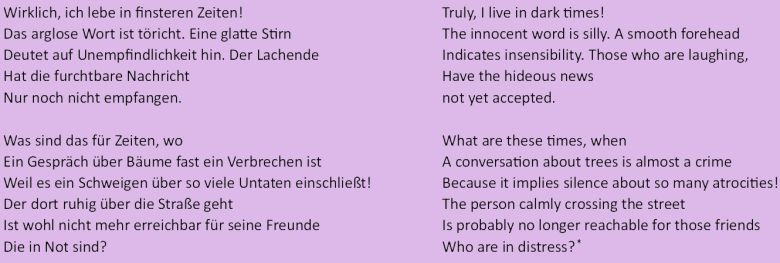
Bertolt Brecht, author of those lines, German poet, playwright, and theater director, left Berlin in 1933, shortly after the National Socialists came to power. “We went, changing countries more often than our shoes / Through class wars, in despair / When there was only injustice and no rebellion,” he continued in this poem “An die Nachgeborenen“ (To the future generations). By the summer of 1939, when the text was published, he had become an artist in exile.
When we launched the mohit.art platform in December 2021, no one could have foreseen the shocking events of the past two years: a new, ongoing major war in Europe over Ukraine, escalating West–East and North–South confrontations, and the homicide and terror in Israel and Palestine that brought the comprehensive, unimagined destruction of international law, the use of disproportionate military force, and the loss of countless lives.
It is precisely in this situation, we devote the issue of mohit.art NOTES #9, dedicated to questions of “desire,” once again to love and, furthermore, to reflections on spatial separation and farewell. In her article “Topography of Displacement,” Golnar Narimani explores experiences of the “In-Between,” of departure and exile, based on a painting series by Tehran artist Moslem Khezri. In addition, as we did two years ago, we take up the photo book format with “TABOO. BORDERS.,” Love partnerships in conflict zones, Israel, Palestine, Cyprus by photographer and writer Ekaterina Bodyagina. We are pleased to be able to publish an interview with Bodyagina alongside excerpts from her project.
This issue of mohit.art NOTES, our last of 2023, is published on December 21 to correspond with Yaldā Night, celebrated by Iranians in Iran and all over the world — and in other countries like Tajikistan, Afghanistan, Turkey and Azerbaijan — regardless of religion and ethnicity. These days of darkness are also illuminated by the light of Jewish Chanukah and Christian Christmas. Tehran musician, lecturer and academic teacher Esmaeil Pirhadi composed and performed two songs for this issue: “In-Between” and “Song for dark times”. They were recorded via a smartphone, amidst the solitude of the German Eifel mountains where Pirhadi is currently artist-in-residence, resulting in an intimate, lo-fi production quality.
In 2024 we aim to continue our vision for mohit.art and our NOTES series with an increased focus on the different cultural scenes of Southwest Asia. We hope to create a forum and network for discourses on contemporary art between those regions and Europe in dark times, when, as Bertolt Brecht wrote, “A conversation about trees is almost a crime / Because it implies silence about so many atrocities!”
We would like to thank all our readers, authors, artists, translators, staff, colleagues, and supporters and wish you all a peaceful holiday.
Header image: Ekaterina Bodyagina, from the TABOO. BORDERS. series, 2017-ongoing. Courtesy of the artist.
Bernd Fechner, “In-Between: Love and Displacement: Editorial,” mohit.art NOTES #9 (January 2024); published on www.mohit.art, December 22, 2023.